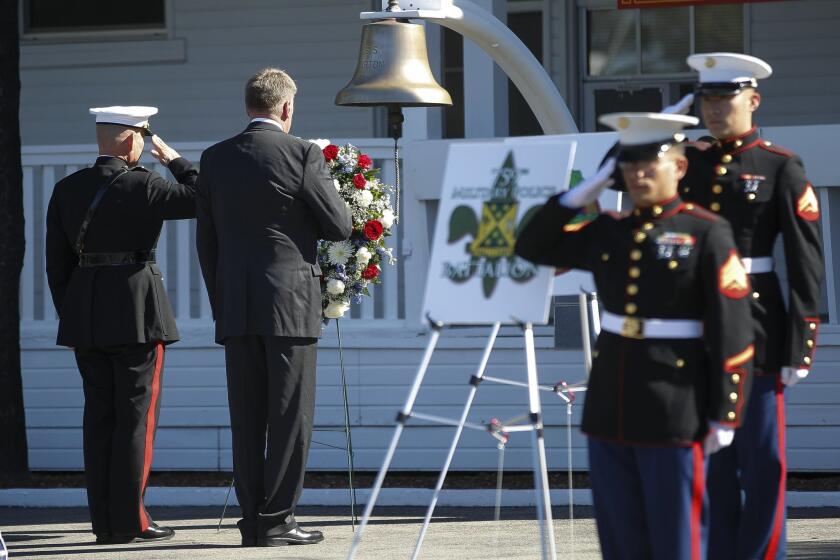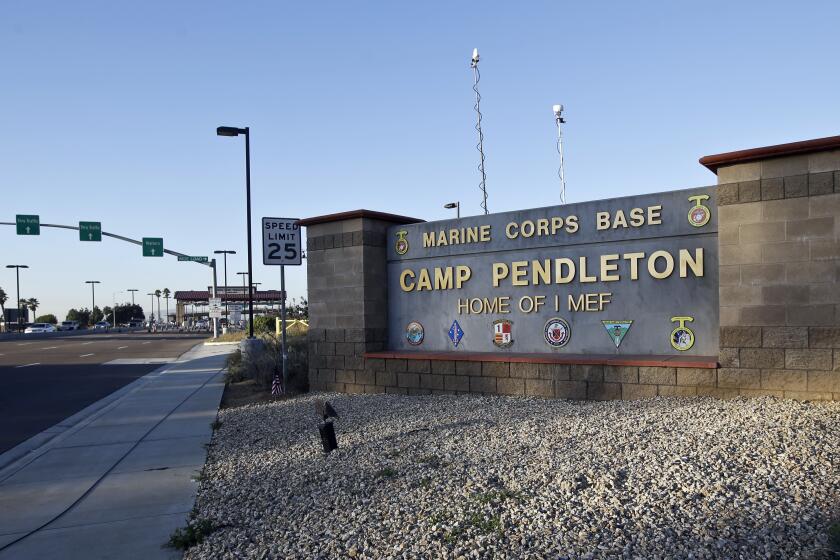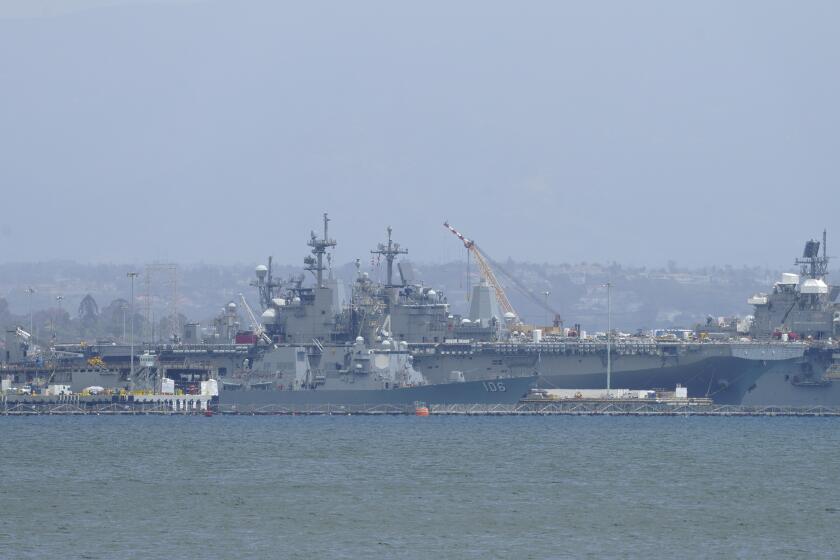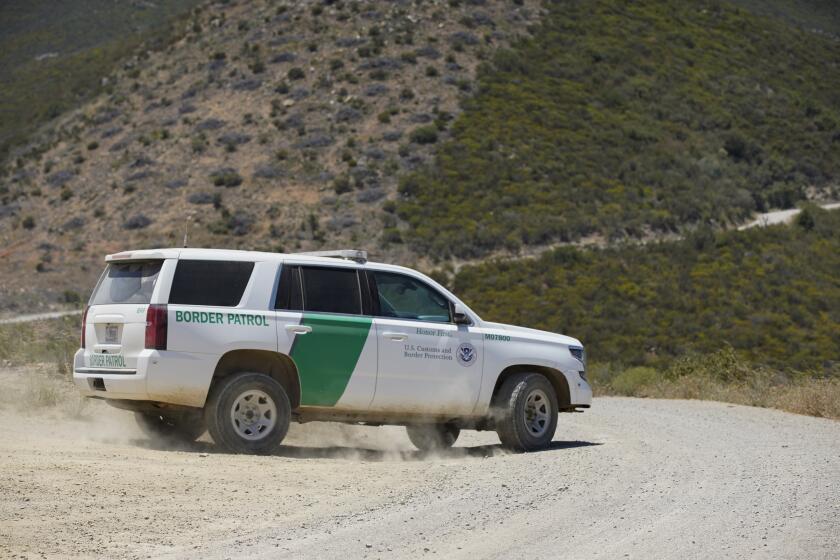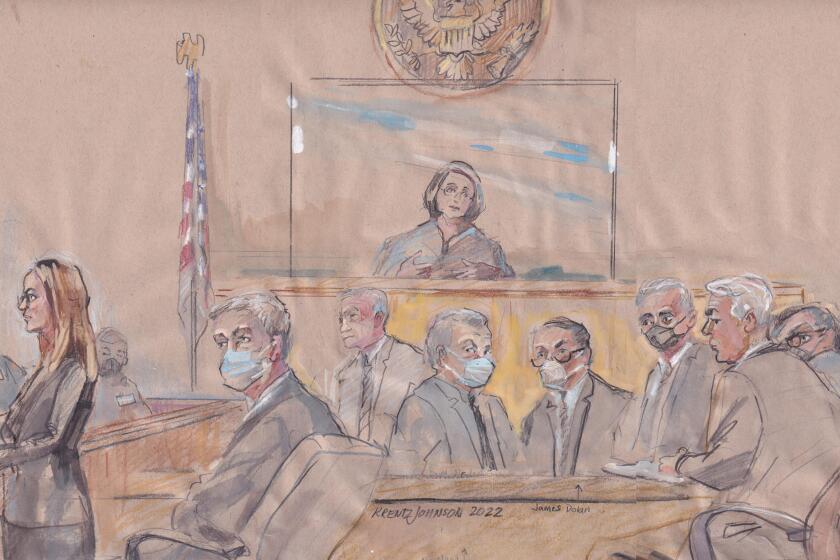Paralyzed Marine walks into retirement
Capt. Derek Herrera, a special operations officer paralyzed from the chest down by an enemy bullet that lodged in his spine, accepted a Bronze Star for combat valor Friday at Camp Pendleton.
Then the 30-year-old Marine retired from active duty and walked off the parade deck toward his next mission — as civilian advocate and entrepreneur working in support of fellow Marine Raiders, wounded troops and paraplegics.
Yes, walked.
During his retirement ceremony at 1st Marine Special Operations Battalion headquarters, Herrera’s relatives, friends and fellow service members watched in reverent silence as he activated his robotic exoskeleton.
Herrera pressed a button on the wristwatch controlling his ReWalk model, switching from standing to walking mode. Then he leaned forward, balancing with his hands on two crutches, with determination and sufficient angle to activate braces attached to his legs.
After pausing for a moment to let muscle spasms subside, Herrera stepped forward. Over the whirring of motors powered by the battery on his back, he put one foot in front of the other. His wife, Maura, walked on one side and his service dog Shaggy on the other, and a Marine had his back should he stumble or fall. But Herrera didn’t falter.
He has come far since he was wounded in June 2012 in the Helmand River Valley of southwestern Afghanistan. More challenges lie ahead, but Herrera said he is unafraid of confronting them.
After insisting that he was “totally average” among his peers, including many others with less visible combat wounds, Herrera promised: “I’m going to continue to struggle and strive for greatness ….
“When I fail, I will do so while daring greatly” to achieve something important and useful, he said to a standing ovation.
Sniper’s bullet
Herrera grew up in Dover, Del., as the son and grandson of career airmen. After graduating from the Naval Academy in 2006, he was commissioned as a Marine officer and joined the 1st Battalion, 9th Marine Regiment.
The infantryman deployed overseas twice with conventional forces, including a 2007 tour to Iraq. Then, instead of taking a more routine “b-billet” stateside, he opted for special operations.
“That’s what Derek did his entire career — is move to the sound of the guns. Put the weight on my shoulders. I got it. Let’s go,” said Lt. Col. John Lynch, commanding officer of the 1st Marine Special Operations Battalion.
In June 2012, Herrera was serving in the upper Gereshk area of Helmand province as leader of Team 8131, Company C. It was one of the most violent areas of the most violent province in Afghanistan.
During an ambush on June 5, Herrera and a joint force of U.S. and Afghan personnel were pinned under heavy enemy fire. Herrera ordered a counterattack with mortars, but the insurgents continued to assault.
Herrera directed his troops to deploy smoke grenades as they bounded toward supporting forces.
“Now in a position of advantage, Capt. Herrera and his team effectively suppressed the attackers with supporting arms and destroyed the insurgent attackers in detail,” according to the citation for his Bronze Star with combat distinguishing device.
Later that month, Herrera was hit in the spine by an enemy sniper bullet. He was paralyzed instantly.
Capt. Matt Lampert, another member of the 1st Marine Special Operations Battalion, was in the same Naval Academy class and attended Marine infantry school with Herrera. Lampert, a double amputee, had returned to combat walking on prosthetic legs and was a mile away when Herrera was wounded in Afghanistan.
Lampert was among those Herrera looked to for motivation during the darkest moments of his rehabilitation, when the hard-charging special operator struggled to accept his new limitations as a paraplegic.
Herrera is a humble guy who excels as a leader, Lampert said. “He’s a phenomenal individual. … It’s easy to hide behind rank and authority, but it’s harder to be a human being and harder to reason with folks.”
Herrera has that ability, Lampert said: “That’s the guy you want to be around for sure, whether it’s in the Marine Corps or out.”
Recovery process
Herrera said the initial period of recovery was tough.
“Initially I had very high hopes, naively, that I would stand up and walk out of the room the next day after I was injured,” he told U-T San Diego this week.
The summer Herrera was wounded, another team leader in his company, Capt. Matt Manoukian, was killed in Afghanistan, among others he was close to.
“While the guys were still deployed, it was really challenging,” he recalled. “My friends were killed, and that reinforced the fact that they were still in harm’s way and I wasn’t there to lead them.”
Eventually, Herrera said, he got tired of feeling sorry for himself. “I realized the incredible gift of life I still have.”
He turned another corner when his unit returned from Afghanistan. His return to work as a staff officer with the battalion was also critical; it gave him a sense of purpose again amid his ongoing recovery at the battalion rehabilitation center.
Herrera began volunteering to speak with virtually any organization that asked, talking about Marine special operations, how he was injured and quality-of-life issues for paraplegics.
To stay active, he began competing in marathons using a hand cycle. But early on, he set his mind on walking again.
During a fundraiser in Coronado in June 2013, Herrera supporters and the MARSOC Foundation raised more than $50,000 to purchase a ReWalk Exoskeleton. That fall, after recovering from complications of heterotopic ossification, or free-floating bone growth, he began using the device.
At first, Herrera could only walk in it under clinical supervision. Then ReWalk was approved for personal use this year by the U.S. Food and Drug Administration, freeing him to practice at home several times a week, with his wife as spotter.
The 6-foot, 2-inch man appreciates the ability to stand and look people in the eye again, as well as the exoskeleton’s health benefits stimulating his muscles and bones.
This week in La Jolla, Herrera gave a demonstration of the ReWalk system during a gathering of the American Technion Society, a support organization for the Israeli technical university whose researchers helped develop ReWalk.
Robotic exoskeletons are one in a number of areas of research and development with promise to improve life for paraplegics, Herrera told the audience. Others include stem cell treatments and spinal stimulation by surgically implanted devices.
In the next five years or so, “A combination of therapies and combination of technologies will provide an exponential increasing quality of life for these individuals,” Herrera predicted. “I hope to convince researchers to join forces.”
Next fight
During a visit to the battalion rehabilitation center, Adm. William McRaven, then commander of U.S. Special Operations Forces, promised Herrera a job in uniform as long as he wanted. After a year serving as the battalion’s future operations officer, planning the transition from Afghanistan to the Pacific, Herrera decided he could do more to serve his community of combat veterans as a civilian.
Lynch, Herrera’s commanding officer, was astonished at first that Herrera wanted to retire, to leave his battalion, a job he knew inside and out, and the safety net of military life. He eventually became convinced that the more selfless choice was for Herrera to walk away from the job he loved. “His impact is going to be global. It’s not about a battalion,” Lynch said.
Herrera expects to graduate with his MBA next July from UCLA. He is working with researchers in Israel and the U.S. on a business plan for a prototype medical device to improve bladder function in paraplegics. And he intends to continue speaking on behalf of all service members, Marine special operations and paraplegics.
“He’s very determined. Some people would say stubborn. It’s a thin line. But he’s worked hard to get where he is today,” said Herrera’s father, Rojo Herrera. “He’s always been one of those people who has a bigger sense of serving and what he can contribute … And he wants to continue that on a larger scale.”
Derek Herrera himself said: “I’ll still be in the fight, just in a different uniform. My goal in the short term is to graduate from school, run a business and move on, and continue to try to help advocate for and serve the people I initially swore to serve — the Marine Corps, the Navy (department) and the greater populace as well.”
Get Essential San Diego, weekday mornings
Get top headlines from the Union-Tribune in your inbox weekday mornings, including top news, local, sports, business, entertainment and opinion.
You may occasionally receive promotional content from the San Diego Union-Tribune.

